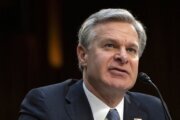One of the first things that former NBA player and “Survivor” contestant Scot Pollard made sure to do after receiving a heart transplant was to write down his feelings when they were fresh, in the hopes that he would someday share them with the donor’s family.
“We want you to know that your loved one’s heart is going to be loved and cared for and will give love back,” Pollard said in a letter that was sent through the transplant network to the hospital where the heart was harvested. “Your loved one is our hero.”
Last week, Pollard heard back: The donor’s family is willing to meet.
“I read the letter a couple of times and it was hard because tears were in my eyes the whole time,” Pollard told The Associated Press on Monday. “I already knew that somebody’s life was cut short. And so, you know, the feelings are mixed. Just like receiving the heart in the first place: I went through a big round of guilt because I knew somebody had to die for me to live.”
An 11-year NBA veteran and a member of the 2008 champion Boston Celtics, Pollard inherited a condition from his father, who died at 54, when Scot was 16. Scot Pollard had known for a few years that his only solution was a heart transplant, but finding a donated organ big enough to pump blood through the 6-foot-11, 260-pound former NBA center was a challenge.
In February, doctors found a match, and the transplant at Vanderbilt University Medical Center was successful. Afterward, Pollard told the AP, he learned his own heart was “a wreck.”
“I don’t think I would have made it another couple of weeks,” he said then.
As he recovered, the 49-year-old former Piston, King, Pacer, Cavalier, Celtic and Kansas Jayhawk used his basketball and reality show fame to raise awareness for organ donations. He also grew even more determined to thank the donor’s family — though doing so requires navigating a process that is intentionally convoluted and lengthy, to protect everyone’s privacy.
Pollard was told he could write a letter and give it to the Vanderbilt team; they would pass it along to the hospital where the heart was harvested. Then they would wait to see if the donor’s family wanted to meet.
“They tell you that most people don’t hear back,” Pollard told the AP in a telephone interview from Nashville, Tennessee, where he had returned for his monthly medical follow-up.
Pollard wrote a two-paragraph letter in the first few of weeks of his recovery, and sent it along in July. Because he was told to limit the amount of personal information, he identified himself only as Scot, from Indiana, with a wife and four children.
He told the donor’s loved ones he would like to thank them in person but understood if they don’t want to meet, or even respond. (The donor most likely died in an accident of some sort that allowed his otherwise healthy organs to be harvested.)
“I understand what had to happen,” Pollard said in the interview. “And I understand that you may not want to relive that. I just want you to know that this person’s my hero.”
He heard back on Friday that the family was willing to meet. (A copy of both letters was shown to the AP on the condition that some details, including the donor’s first name and the date of his death, be excluded to protect his anonymity.)
“You warmed our hearts with your kind words concerning your donor who was loved beyond measure,” they responded. “(It) was an incredibly hard day for those of us that loved your donor … but we rejoiced knowing that others would be helped.”
What’s next for Pollard, who is working with a documentary crew on his story, was to sign a release with his full information and hope that the donor’s family does as well. His desire to tell his story and recruit more organ donors – and include them in it – is the last potential hurdle before a meeting.
“I want to make sure that they’re OK with going public,” he said. “They have my personal information. They can call me any time.”
___
AP NBA: https://apnews.com/hub/NBA
Copyright © 2024 The Associated Press. All rights reserved. This material may not be published, broadcast, written or redistributed.





